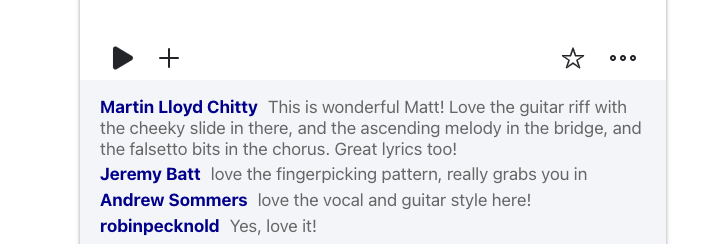When I last wrote here, I was halfway through a four-week songwriting course taught by Robin Pecknold of Fleet Foxes fame, facilitated by LA-based School of Song. It’s an online class conducted over Discord and Zoom – each week, participants are set a homework assignment, and join a Zoom breakout room with 3-4 random coursemates to share their music and give feedback.
By the midway point of the course, I’d produced a piece of music I was incredibly proud of. Not because it’s a perfectly polished recording or something that represents the apex of my creative ability, but because it’s something I couldn’t have conceived of writing a month before the course began.
Taking inspiration from opium
Our second lecture was “Melody & Lyrics” and we learned about techniques like extensions (a note outside the triad of a given chord, eg. Dm9 rather than plain old Dm), appoggiatura (an added non-chord note in a melody that is resolved to the regular note of the chord) and mode shifts (eg. moving from aeolian to dorian mode, for example). Some of this was new to me and some of it was giving names to things I did without realising on guitar (my main instrument).
I bought an 88 key midi controller (like an electric keyboard but you need a computer to provide the audio) last Christmas and this second class provided the inspiration for me to write something on it. Inspired by the class, I picked out some chord shapes I already knew, then tried to add extensions and new notes. I tried to find a vocal melody which didn’t resolve to the “obvious” notes in the scale, and used a suggestion of Robin’s for finding lyrical inspiration: take lines from poems/books and find a way to adapt/translate them for your own sound.
In my case, I looked at Project Gutenberg (a repository of out-of-copyright books) and looked up Confessions of an English Opium-Eater, by Thomas De Quincey, a favourite of mine from university. I looked up a brilliant passage about the narrator’s opium-induced dream about ancient Egypt and used it as the basis for this song:
The song poured out of me and I put together three verses, a bridge and a chorus in a short space of time, feeling like I’d finally tapped into something subconscious where I knew what story I wanted to tell with the words. I recorded a few takes of the vocal but didn’t overthink it, and in the final mix embedded here you can hear a vocal outtake in the background which works well—sometimes—as a harmony/echo with the main vocal, a nice touch of serendipity. It’s not the most polished thing I’ve ever done, but the growth it represented in my work made me incredibly proud.
Great artists steal
The following week’s class was specifically about lyrics and gave us some homework themes including “the magpie”, about trying to copy certain aspects (a drum sound, a lyrical approach, a dynamic quality etc) of multiple songs and merge them into something new. I ended up writing two songs for this: one an effort to make something with the guitar riff energy of Minus The Bear, and another which tried to ape the vocal style of the Tallest Man On Earth (and let’s be honest, the guitar style too).
I was really proud of both pieces and although they’re clearly indebted to the artists who inspired them, I was encouraged that they sounded like real songs too, rather than just plain copies. One of them even got the seal of approval from Robin himself on the School of Song’s jukebox, which I was very happy with – even just the idea that he heard something I wrote was pretty thrilling, however much of a fanboy that makes me sound.

By the final lecture of the course, we were all quite emotional: a couple of thousand people had been on this course and we’d all made ourselves vulnerable each week, sharing our work with one another and asking for feedback. In the final song share, I played two strangers the song I’d written about the journey my partner and I have been on these past few years, while they shared music about a parents’ dementia and an intense, physical love for someone else. It really felt like we’d all pushed through something and built a new thing together.
The course finished a month ago now but I’ve been aiming to keep the same energy and output going: I have six complete songs, three or four which just need lyrics, and a hundred ideas kicking around in Garageband files. My aspiration is to release them as a couple of EPs or a whole album (depending on how well I can convince myself that they fit together thematically/musically). My confidence is hugely increased: I know this stuff isn’t the best music ever recorded and I’m aware I’m not going to set the streaming services alight overnight if this music ever makes it there. But I also know that by my own standards, this is the best stuff I’ve ever done, and much more than I could have imagined doing before starting the course.
The School of Song offer a bunch of other courses besides the one I did: there are guest teachers from famous indie bands aplenty, but there are also musical specialists teaching things like guitar skills, piano basics, advanced music theory and recording technique. The community is as welcoming and motivating as anything I’ve ever come across (in fact, more so) and it’s given me creative permission to break out of my comfort zone and a decade-long creative dry patch where it was easier to just play covers than do anything original. I still have a way to go, but I’m so glad I started this.